- Home
- Matthew Costello
Cherringham--Death Trap Page 4
Cherringham--Death Trap Read online
Page 4
Jack walked slowly round the trampled area and took in the scene.
Years ago, when he first came to Cherringham, he’d been fascinated by these old stocks. A medieval punishment still standing — the wood splintery but still sturdy, right in the middle of the village!
He stepped over the tape and crouched next to the stocks. Ran his hand over the ancient wood.
Hewn oak, he guessed, worn by the passage of the years but still iron-hard. Back when there were such trees to cut and use.
And a metal frame and chain-peg locking system that would still hold a felon tight in its grip — head through one hole, hands a yard apart through two more.
The nasty idea being, the miscreant would be trapped on their knees for the duration of the punishment, and the locals could do whatever they pleased to exact their revenge.
One can only imagine …
From hurling vegetables at his head, to giving him a good kick at the other end.
There’d been times back on the beat in Brooklyn, Jack might have welcomed such a system. Prisons certainly didn’t seem to work.
Rough justice.
Had someone dealt rough justice to Edward Townes last night?
He lifted the pin from its slot and opened the stocks. Then closed them again. Dropped the pin back in.
Such a tiny piece of metal.
But if your hands and head were now inside the stocks it would be impossible to reach the pin — pull it out.
“What do you think, Jack?” said Sarah, joining him.
Jack turned. Over her shoulder he could see Tony and Michael leaning against the Land Rover, chatting. The engine no doubt warming their backs.
“You think he — of course, drunk — stuck his hands and head through for a joke? Got trapped?”
“Sure. Possible,” said Jack. “Blizzard last night. Empty square. If he called out — doubt anyone would hear him.”
“Drunk. Freezing cold. Wouldn’t take long. Eventually … just fell asleep …”
“And died.”
He sensed that Sarah knew that he hadn’t bought into that theory. Least not yet.
And Sarah picked up on that. “But as Dad says — Townes was no joker. So, maybe, I don’t know … Maybe he was with someone who was? Somebody who liked playing around? ‘Show me how the stocks work, Edward’. That kind of thing?”
“Maybe. Persuades Townes to put his head in — then what? Gets bored, Townes yammering away. So this ‘friend’ heads home to sleep it off — not realising Townes can’t get out?”
“Hmm. I can buy that,” said Sarah. “But it’s a big maybe …”
Jack watched as she tugged at the metal peg and chain that held the stocks together.
She, too, lifted the pin easily in and out of its slot.
“If your head and hands are already trapped,” she said, “and the peg and chain in place, then this is impossible to open.”
“Takes it out of the ‘prank’ department. Okay, on the other hand, how about this. What if somebody knocked Townes down? Dragged him through the snow — raised the top, stuck him in, and lowered it?”
“Assuming you could drag the drunk Townes, I guess it could be done,” said Sarah. “Then just pop that little peg into its slot and walk away. Job done.”
“Murder … done. Okay. Couple of theories.” He stood up and smiled at that. “We need to know more. More about Edward Townes — and more about the people he was with last night. More about that party.”
“We going to do this?” said Sarah.
“Oh, I think so — don’t you?”
“Absolutely.”
Jack nodded, then turned, raised his voice. “Tony?”
He waited while Tony walked over.
“Well, we’re on the case — if it is a case,” said Jack.
“Excellent!” said Tony. “How can I help?”
“Well, how about I first talk to you, get a bit more background? Michael said you were Edward’s lawyer?”
“I was indeed.”
“Then we need to talk to Edward’s family,” said Jack. “And as many of the people who were at that party.”
“First part’s easy enough,” said Tony. “Edward lived with his wife Emily — just behind the square, there.”
“You think she’ll be up for talking to us?” said Sarah.
“I took the liberty of asking her already,” said Tony. “She’s terribly upset. Confused. But I think she wants to know what happened. Set her mind at rest.”
“What about the party?” said Jack. “Mostly locals?”
“Some. But as far as I know, most of them came up from London. Couldn’t get back last night — I gather the Bell did its best to find space for them. Packed in like sardines, so I hear.” Tony raised his eyebrows. “Should be quite a scene there!”
Jack turned to Sarah. “Sounds like we could be in the village all day — that work for you?”
“You mean, what does my diary look like?” she said laughing. “Office is closed. Daniel’s going to be out with his pals until it gets dark. Chloe’s in London with her dad. I’m a free spirit, Jack.”
“Michael — why don’t you head home, get warm, and we’ll call you when we have something? Think we’ll need a lift home if that’s ok? Might be late?”
“Sure, Jack. And — thanks.”
“No problem,” said Jack. “Oh, and perhaps you could do me a favour? Pick up Riley from the boat and look after him till I get back?”
“Happy to.”
As Michael climbed in the Land Rover and fired up the engine, Jack turned to Tony and Sarah. “Think there’s anywhere open the three of us can grab a coffee?”
“Come to my place, Jack. The stove is on and I have a Columbian blend that’ll match any establishment in the village, even Huffington’s. I do believe I have some very nice biscuits as well.”
“Sounds better than good, Tony — lead the way,” said Jack, looking forward to the warmth.
*
Sarah sat back on Tony’s cosy sofa and sipped her tea. Tony — the quintessential country solicitor — was such an old family friend. She’d been coming to this house in the centre of the village for years.
Jack sat next to her, and Tony sat by the stove in a battered old leather armchair. Jack had popped out a small notebook. She knew you’d never catch him without it.
Sarah slipped out her own version, a small spiral notebook that, with its frayed edges and folds, showed the signs of being repeatedly shoved in and out of her jeans.
“So — to start — how long did you know Edward?” said Jack.
“Oh, I imagine twenty years. Perhaps more. He and Emily moved here from London in the nineties.”
“And you acted for him, in what role?”
“Yes. Well, not as an agent, of course. But I reviewed contracts, handled any legal problems, advised on rights and so on.”
Sarah reached down and took her cup of the — as Tony advertised — brilliantly strong coffee. “Tony, did you know of any … personal issues?”
“Hmm, yes,” said Jack. “In Cherringham or London, did Townes ever talk about any enemies?”
Sarah watched Tony rub his chin, considering this.
Perhaps things he can’t tell us? thought Sarah.
“Um, well … Edward was a larger-than-life character,” said Tony. “He was — how can I put it? — rather drawn towards excesses. In every area of his life.”
“Okay,” said Jack, “guessing people don’t always like that. Wife, publisher, maybe other husbands. Can cause friction.”
“Exactly. He was quite aggressive pushing his books in the early days. Grabbed publicity wherever and however he could. Knocked a lot of people’s noses out of joint. Give him a bad review, and you heard from him! And well, put himself about a bit too, I have to say.”
Sarah could guess what Tony meant. But …
“How do you mean?” said Jack.
“Um. Well, let us just say he didn’t have much respect for the instit
ution of marriage. His own — or other people’s.”
“Ah,” said Jack. “Messy stuff. Even dangerous. Anything you had to deal with?”
“Nothing that ever went to court. But more than once he had to pay for certain stories to go away.”
Had that all ended, Sarah wondered?
“Any threats?” said Sarah. “Perhaps recently?”
“Not threats, exactly. But he did say the other day he’d been getting phone calls.”
“Threatening calls?” said Jack.
“Disturbing, perhaps a better word.”
“You get a name?”
“Edward didn’t tell me. But I got the impression — somehow — it wasn’t a new problem.”
“How about the drink?” said Jack. “That get him into trouble?”
“Trouble? Yes,” said Tony. “In fact, a couple of times Alan had to steer him home from the Angel to sleep it off.”
“What about finances?” said Sarah. “Paying people to go away. Did he have any money problems?”
“Possible. He used to be pretty comfortably off, back in the day. But he spent liberally, and I believe sales have fallen dramatically these last three or four years. Not that that stopped him spending. He talked to me once about changing publishers — but apparently Lane’s finally made a slightly better offer.”
“Lane’s?” said Jack.
“His publishers. Started by, and still run by, a chap called Humphrey Lane. He was here last night, apparently.”
“Ah. For this party?” said Sarah.
“That’s right. Whole bunch of London types. Including his agent. Lady called Jane Ellingham. Actually, you really should talk to her. She knows everybody. And every thing too I suspect. Any skeletons in Townes’s cupboard, I imagine she’s the one to ask.”
Sarah looked over at Jack jotting the name down. She turned back to Tony.
“One last question,” she said. “Did he have any friends in the village? People he might have confided in?”
“Hmm, friends. Interesting. Now you ask me, I can’t really think of anybody. Rather sad, that, don’t you think?”
“Very,” said Sarah, putting down her cup and saucer.
Townes had enemies but no friends.
Could be a lethal combination.
The idea of Townes having a prank with a mate … Larking around in the snow … Clearly wasn’t very likely …
“More coffee?” said Tony.
She shook her head. Jack as well. “Seems we have lot of people to talk to.”
“Right. In which case — shall I take you to meet Emily?” said Tony. “Only a couple of minutes down the lane — if we can make it through the drifts of course!”
“Good idea,” said Sarah, standing. “We need to get moving — before it snows again.”
“I do hope not!” Tony said standing up. Whole village is at a standstill as it is. Can we handle any more of the white stuff? I’ll get my coat.”
Jack had already pulled their coats off Tony’s wooden rack, ready to brave the outside once more.
But when they all stepped out into the street a few minutes later, the snow was falling. And Sarah could see — so cold — the new snow was sticking fast.
Might need more than Dad’s Land Rover to get us home this evening, she thought.
7. The Writer’s Wife
Jack knocked on the front door of the cottage and waited. Over Sarah’s shoulder, he could see Tony plodding carefully through the snow back to his house.
“Coming down thick again,” he said.
“Get ready for power cuts, Jack,” said Sarah. “We don’t really do snow in England.”
The door opened and he turned, expecting to see Emily Townes. But a man stood there: silver hair, plump, well-cut country tweeds, bow-tie and claret v-neck.
“Yes?” said the man, face flushed.
“Sarah Edwards, Jack Brennan,” said Sarah. “Mrs Townes … is expecting us.”
“Really?” said the man. He pushed the door almost closed again and turned to say something into the house.
Jack looked at Sarah — she raised her eyebrows.
The door opened wide again.
“Hmm. You’d better come in. Boots off, all right?”
Nice to meet you, too, Jack thought at the man’s command as they went in.
*
Sarah followed Jack into the kitchen at the back of the house.
The place was deceptive — from the outside, a basic two-up-two-down workman’s cottage but with a big open extension on the back, all glass walls and skylights.
Not cheap that …
And the top-of-the-range kitchen looked brand new. No expense spared on the state-of-the-art Aga.
Original art on the walls.
Someone’s been spending big, she thought. So much for sales going down.
The man who let them in marched into the room then stood to one side, arms folded, as if to say, not my decision to invite you in.
Sitting on a big leather sofa in the corner of the room, was a small woman in a drab grey cardigan and skirt. Face raw, make-up smudged. Sarah went over to her.
“Mrs Townes? I’m so sorry for your loss. Please … don’t get up.”
The grieving widow slowly stared up at her.
“Sarah? And Mr Brennan? Yes. Tony said you would come. I’m so grateful. Can I make you a tea? Humphrey, could you …? There should be biscuits. In the cupboard. Top shelf. There must be. We always have biscuits. Edward likes to—”
She stopped. Sarah looked at Jack, then the man — Humphrey. He came over to her.
“There, there, don’t you fret, Emily.”
Then he turned to Sarah and Jack: “Hardly the most appropriate timing, this, is it?”
“And you are?” said Jack.
“Humphrey Lane, Edward’s publisher, and old family friend. Might I suggest we forego the tea and such, and you just say what you came to say and then go?”
“Understand where you’re coming from, Mr Lane,” said Jack.
Sarah watched him step forward, between Lane and Emily, then put a hand on Lane’s shoulder. A firm hand that Sarah knew of old carried a simple message: I’m in charge here, pal.
“Thing is, Mrs Townes asked us to help. So, with all due respect, I think it’s for her to judge. Don’t you?”
She saw Lane freeze for a couple of seconds.
Not used to being talked to like that, she thought.
Then she saw his body language shift, the bluster all gone — as if Jack had stuck a pin in a balloon.
“White, no sugar, thank you, Mr Lane,” said Jack, smiling.
Lane’s expression did not change, but he obediently crossed the kitchen and filled the kettle.
Jack’s enjoying this, Sarah thought.
Never a good idea to push back against Jack Brennan.
“Sarah, the same?”
She nodded.
Sarah saw Jack give her the briefest of nods — her signal to take over. She joined Mrs Townes on the sofa as Jack pulled a kitchen chair over and sat by her side.
“Mrs Townes, this isn’t going to take long, but we know you want to find out what happened last night.”
“Please — call me Emily.”
Sarah took out her notebook and pen — she’d found in situations like this, with emotions raw, that the formality of notes helped people stay focused.
“Why don’t you tell me about yesterday evening — in your own words?” she said.
Emily took a paper handkerchief from inside her sleeve, blew her nose, then started to speak.
“It was supposed to be such fun. A medieval banquet for Edward’s new book, The Squire’s Secret. Lots of important people. A feast. Proper party — all organised by Humphrey here. B-but Edward got into one of his moods. Started drinking. So much! Said things he probably shouldn’t have.”
Lane kept himself busy with the kettle and the range.
Interesting.
“He upset people at the party?” sai
d Sarah.
“Edward could be very … blunt, you know? Some people found that hard to take.”
“Last night … anyone in particular you can remember?” said Jack.
Sarah waited, but Emily seemed frozen.
“Perhaps somebody Edward argued with?” said Sarah.
Then: “Well,” said Emily. “I suppose … the actors.”
“Actors?” said Sarah.
“They had people there. Some kind of medieval players. Edward had words with them.”
“Did Edward know them personally?”
A pause.
“Oh no. It was probably the ridiculous costumes and antics that upset him. Edward was a stickler for accuracy, you see. He stopped some of them having a duel. Wrong swords or some such.” A deep breath. “That’s Edward!”
“Who else?”
“Oh, I don’t know. He spoke to a lot of people. Was he rude to them? Well …”
“Anyone in particular?” Jack pushed.
“Um, some other writer, one of Humphrey’s authors I believe.”
Sarah looked across at Lane, who nodded.
“Oh, and one of the women serving the tables. Made a comment to her, apparently. Um … that writer’s agent. Oh yes, and his own agent. She didn’t seem too happy! Then there was the girl who did the cloakroom. Oh, and the man serving the food. That’s right, yes. And the man behind the bar. And the nice lady from that trade magazine …”
Sarah lowered her pen. This was quite a list.
“Edward argued with all of them?” said Sarah.
“Yes.”
Sarah looked over at Jack who nodded gently.
Handover time.
“Think I’m getting the picture, Emily,” said Jack. “Guess it was one of those nights.”
“With him, it often was.”
“And last night, these were just, kinda general arguments? Or were they big rows?”
Sarah saw Mrs Townes’s eyes flick across quickly to Humphrey Lane then back again.
“They were just the usual. A careless word here and there.”
Finally, the tea ready — its preparation stretched as long as possible — Humphrey Lane returned. He’d clearly been listening.
“Edward could become a tad over-emotional after he’d had the extra glass, if you know what I mean?” said Lane, stepping forward with a tray and putting it on the coffee table. “Lovely man of course. One of my dear, dear friends. But not the easiest chap to get along with.”

 Cherringham--Too Many Lies
Cherringham--Too Many Lies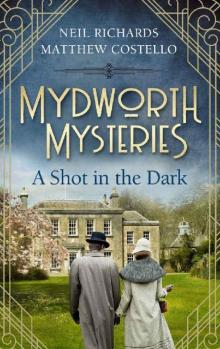 Mydworth Mysteries - A Shot in the Dark (A Cosy Historical Mystery Series Book 1)
Mydworth Mysteries - A Shot in the Dark (A Cosy Historical Mystery Series Book 1) Cherringham--The Gentleman Vanishes
Cherringham--The Gentleman Vanishes Cherringham--Cliffhanger
Cherringham--Cliffhanger Beneath Still Waters
Beneath Still Waters Cherringham--Trail of Lies
Cherringham--Trail of Lies The Gentleman Vanishes
The Gentleman Vanishes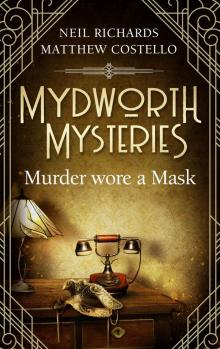 Mydworth Mysteries--Murder wore a Mask
Mydworth Mysteries--Murder wore a Mask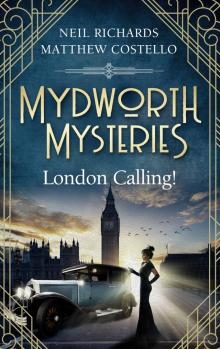 Mydworth Mysteries--London Calling!
Mydworth Mysteries--London Calling!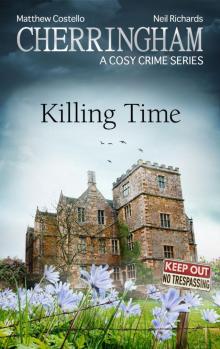 Cherringham--Killing Time
Cherringham--Killing Time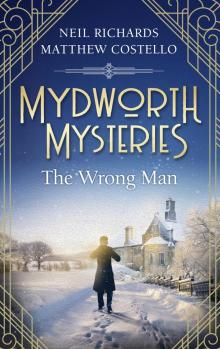 Mydworth Mysteries--The Wrong Man
Mydworth Mysteries--The Wrong Man Cherringham - The Drowned Man
Cherringham - The Drowned Man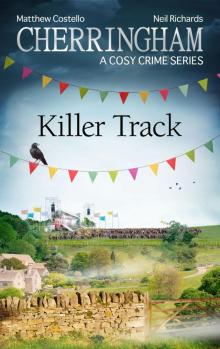 Cherringham--Killer Track
Cherringham--Killer Track Cherringham--The Secret of Brimley Manor
Cherringham--The Secret of Brimley Manor A Deadly Confession
A Deadly Confession Cherringham--Murder under the Sun
Cherringham--Murder under the Sun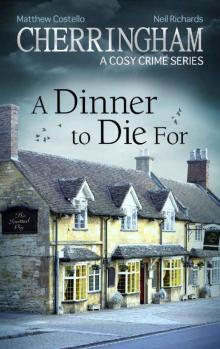 Cherringham - A Dinner to Die For
Cherringham - A Dinner to Die For Family
Family Cherringham--Death Trap
Cherringham--Death Trap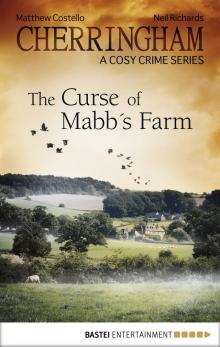 Cherringham--The Curse of Mabb's Farm
Cherringham--The Curse of Mabb's Farm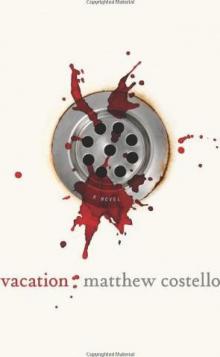 Vacation
Vacation Cherringham--A Bad Lie
Cherringham--A Bad Lie Doom 3™: Worlds on Fire
Doom 3™: Worlds on Fire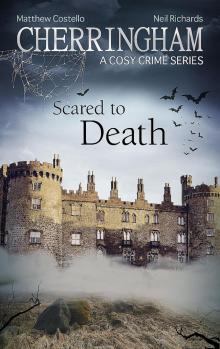 Cherringham--Scared to Death
Cherringham--Scared to Death Home
Home Dead in the Water
Dead in the Water Star Road
Star Road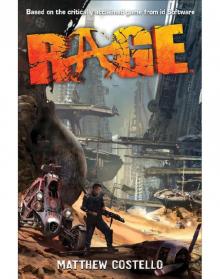 Rage
Rage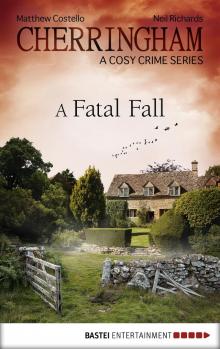 Cherringham--A Fatal Fall
Cherringham--A Fatal Fall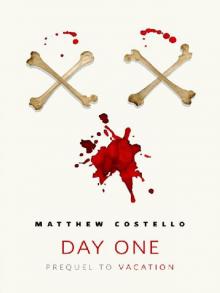 Jack Murphy_Prequel_Day One
Jack Murphy_Prequel_Day One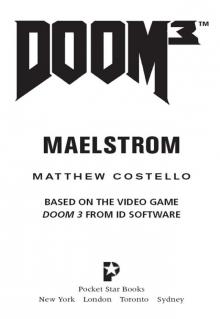 Doom 3™: Maelstrom
Doom 3™: Maelstrom